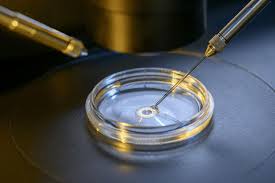3 reasons in-vitro fertilization is intrinsically immoral and the matter of grave sin:
a) It involves killing human beings. Offspring in their embryonic stage of maturity are created and destroyed (killed, or left frozen in suspended animation) as part of the process. At least 10 are killed in the attempt that one may survive.
b) As God’s image, persons are meant to be ‘begotten, not made,’ as is written in the Creed. As the Holy Spirit is eternally begotten of the love bewteen the Father and the Son, so too must the child be begotten of the act of love-union between the man and woman – not made or manufactured through the tools of a third party in a Petri dish. Performing the latter also bypasses the natural selection of the female reproductive tract that is made to selectively accept the healthiest sperm cells.
c) Children born of this process of in-vitro fertilization feel as though they are ‘products of conception,’ a phrase abortion advocates have commonly used to depersonalize preborn human beings.
3 important underlying principles:
1) The unitive and procreative meaning of sexual love are one and must never be intentionally ruptured or separated to cause sterility. Doing so is a fundamental violation of the natural moral law.
2) A child is a gift, not a right. Gifts must never be coveted or grasped where one is willing to employ immoral means to obtain them.
3) A child is a person to be loved, not an object to be demanded.
2 related thoughts:
x) Human judgment can easily rationalize wrongdoing, as Eve did in claiming the forbidden fruit was “good for food, pleasing to the eyes, and desirable for gaining wisdom” (Gn 3:6). Original sin echoes down to our own attitudes when we choose our will over God’s.
y) God can create immense good out of moral evil. In-vitro fertilization is an example. Children conceived through in-vitro are as valuable, dignified, and loved by God as any other. However, as St. Paul warns, one may never do an evil so that good may from it (Rom 3:8). Choosing an unnatural sinful act (in-vitro) to obtain a good consequence (a baby) is the matter of serious sin.
Further reading:
http://www.vatican.va/roman_curia/congregations/cfaith/documents/rc_con_cfaith_doc_20081208_dignitas-personae_en.html
http://www.vatican.va/roman_curia/congregations/cfaith/documents/rc_con_cfaith_doc_19870222_respect-for-human-life_en.html


Hi Paul, I have been a fan of yours for a long time. I never ever comment on fb as that amounts to arguing with idiots. I never usually say anything ever. Your writings are usually printed and passed around or kept in my scrap book of important thoughts.Usually brilliant but off the mark here.
I have been a student of political and religious history for almost two decades and have a very “Big picture” view of human events. We are former catholics and current “Evangelical” home schoolers of three boys. All IVF babies, None of whom feel like a “product of conception”. This article makes many quite large assumptions about who we are and who our children are.
Yes, now there is widespread abuse of this technology with every “family” thinking they have a right to a child. My wife of twenty three years was born with a Fallopian tube defect caused by a prescribed medication taken by her mother while pregnant. Removal of these damaged tubes and IVF treatment resulted in our three boys that the fb keyboard heroes think should not exist. Should we not have used this readily available treatment to overcome a problem caused by yet another fault of mans pharmaceuticals?
All of our embryos were highly regarded by us and all were used. Most people don’t know that the human female naturally discards embryos without anyone even knowing during her natural sexually active life. A very early miscarriage gone unnoticed. I truly think this article should have included a caveat to allow for these situations. I will not get involved in any back and forth with commenters as that is beneath most of us and no ones heart is changed by arguing.
You have a following, some of whom you may not be aware of. Be sure to choose your published thoughts carefully as you have a lot of influence as actual good journalism is very hard to come by.
JMJ
Dan, thanks for the kind note. Your post is important. I will offer a theological response, and a philosophical problem that springs from it.
Of the entirety of the Church’s moral doctrine, I find this principle of the most difficult for people to understand today: the inseparability principle, which holds that the unitive and procreative significance of the sexual act can never be intentionally separated or replaced. It upholds the moral truth that procreation cannot be impeded, or manufactured, but must be respected as the natural end of the love-union of “the two becoming one-flesh” (Gn 2:24). Guided by the Holy Spirit, the Church teaches this principle to be a moral absolute as a matter of natural law, not a Church discipline. This means it applies to everyone, of any religion or no religion, by virtue of having a human nature. Some acts that violate human nature can never become good despite the intent or circumstances. This militates against modern sensibilities, since we falsely believe ourselves to be the arbiter and ultimate authority of our own morality, rather than God through Christ through His body the Church. This inseparabilty principle upholds the illicit nature of both contraception (union with impeding procreation) and in-vitro fertilization (procreation without union).
Those who support both contraception and in-vitro fertilization seem to approach the question from a consequentialist point of view – i.e. good consequences can justify an act. Natural law, however, primarily looks at the act itself and states the ends can never justify the means. If a person fails to recognize the intrinsic immorality of separating/replacing sexual union from procreation (as most do today), it becomes rather easy to justify both acts. And in your case it seems more justifiable, since it is in favor making life rather than impeding it (as contraception does). I get it. However, there are deep spiritual and ontological reasons why acts that intentionally separate or replace sex from procreation are wrong, some of which I summarized in my original post. If you are truly interested in the Church’s take on this issue, I implore you to read the two documents for which I left links at the bottom of the original post: Dignitas Persona and Donum Vitae. They’re in English.
The philosophical problem lies in the fact that great good can come out of moral evil. You’ve got three wonderful boys who would not exist had in-vitro not been utilized. Likewise, it is not unusual for me to have an in-vitro student in one of my college classes. Is the Church saying these people should not exist? A more obvious example of this question is rape, or incest, or any child born from premarital sex. Is these children conceived not of God’s will – since they came into existence through a sinful act? It is a great mystery how these two truths relate: a) God wills each one of us from all eternity, and b) this includes those conceived through immoral means. Does this mean God wills sin? Not directly or positively; but He does will the existence of people who came to be through sin. The paradoxical mystery is that God through His permissive will brings about the ends that He wills from all eternity, through our sinful acts. It’s like the old saying, ‘God writes striaght with the crooked lines we give Him.’ This is something we, having limited intellects, cannot fully comprehend.
So, yes, these children are willed and loved by God, just as all others are. In fact, if you go back far enough none of us would exist had rape, adultery, or fornication not occurred in some of our ancestors. We must ponder deeper the mystery of how predestination and free will are not mutually contradictory in God; and how He sin is morally prohibited even though great good may come out of it.
Peace.
Jmj??
JMJ is a form of prayer… stands for Jesus, Mary and Joseph. I pray to the Holy Family for our openness to God’s will and a greater understanding to His Truth…. such as a greater respect for the natural way of procreation ordained by God. Reading these reflections and comments helps. May God bless all families – so under attack from many different directions.